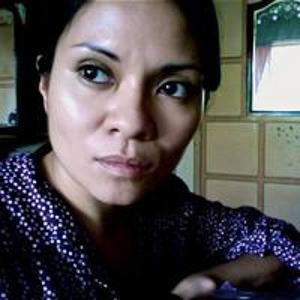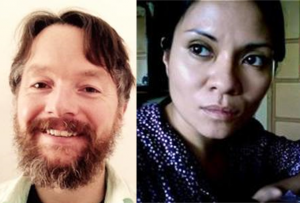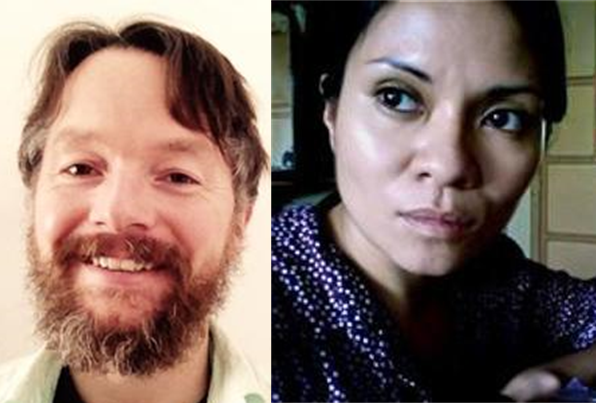Dr. Christina Verano Sornito and Dr. Jon Carter have both been named 2017-18 Humanities Fellows in the College of Arts & Sciences. Each year, the College funds up to three fellowships for untenured tenure-track faculty whose research is focused primarily in the humanities. The purpose is to promote scholarly and creative activity.
 Dr. Christina Verano Sornito, an assistant professor in the Department of Anthropology that specializes in visual anthropology, is one of this year’s recipients of the 2016 College of Art and Sciences Humanities Scholars Fellowship. This funding will support research and pre-production for an ethnographic film project titled, "Asocena: A Video Cookbook of Taboo and Colonial Tropes in the Philippines", which will examine the Filipino practice of cooking and eating dog meat in the larger context of colonial tropes and taboos set into place during the 1893 Columbian World's Exposition in Chicago and the 1904 St. Louis World's Fair. During her fieldwork in the Philippine Islands in 2011, Dr. Sornito documented a group of friends partaking in the preparation and consumption of a dog, a meal that in the local language is called "asocena". Dog-eating was officially banned in the Philippines under animal cruelty laws in the 1990s, but remains an underground recipe throughout the archipelago. Now a "taboo", the film explores how racist-colonialist portrayals of Filipino peoples and practices during the world's fair form the underpinnings for this recipe to become a modern taboo in the postcolony.
Dr. Christina Verano Sornito, an assistant professor in the Department of Anthropology that specializes in visual anthropology, is one of this year’s recipients of the 2016 College of Art and Sciences Humanities Scholars Fellowship. This funding will support research and pre-production for an ethnographic film project titled, "Asocena: A Video Cookbook of Taboo and Colonial Tropes in the Philippines", which will examine the Filipino practice of cooking and eating dog meat in the larger context of colonial tropes and taboos set into place during the 1893 Columbian World's Exposition in Chicago and the 1904 St. Louis World's Fair. During her fieldwork in the Philippine Islands in 2011, Dr. Sornito documented a group of friends partaking in the preparation and consumption of a dog, a meal that in the local language is called "asocena". Dog-eating was officially banned in the Philippines under animal cruelty laws in the 1990s, but remains an underground recipe throughout the archipelago. Now a "taboo", the film explores how racist-colonialist portrayals of Filipino peoples and practices during the world's fair form the underpinnings for this recipe to become a modern taboo in the postcolony.
 Department of Anthropology assistant professor and sociocultural anthropologist Dr. Jon Carter is one of this year’s recipients of the College of Arts and Sciences Humanities Scholars Fellowship. This funding will support his project “Ethnographic Surrealism in the Americas, 1928-Present” which examines the intellectual and intimate relationship between Roger Caillois, a French surrealist-anthropologist arriving in Argentina as he fled fascism, and Victoria Ocampo, Argentine writer, translator, publisher, feminist, and founder of the review Sur. Dr. Carter will use the research funding to travel to Harvard University Libraries, to examine a collection of letters exchanged by Caillois and Ocampo, written between 1939 and 1978, which are held in the Harvard Library archives. Analysis of the letters is part of Dr. Carter’s new research project, which examines how anthropology, ethnography, literature, and the arts in South America of the early twentieth century, came together in the practice of different scholars who bridged the divide between science and art. The love-affair between Caillois and Ocampo is one of the most intriguing episodes of exchange between a European avant-garde displaced by war, and the major figures of South American literary and ethnological modernism.
Department of Anthropology assistant professor and sociocultural anthropologist Dr. Jon Carter is one of this year’s recipients of the College of Arts and Sciences Humanities Scholars Fellowship. This funding will support his project “Ethnographic Surrealism in the Americas, 1928-Present” which examines the intellectual and intimate relationship between Roger Caillois, a French surrealist-anthropologist arriving in Argentina as he fled fascism, and Victoria Ocampo, Argentine writer, translator, publisher, feminist, and founder of the review Sur. Dr. Carter will use the research funding to travel to Harvard University Libraries, to examine a collection of letters exchanged by Caillois and Ocampo, written between 1939 and 1978, which are held in the Harvard Library archives. Analysis of the letters is part of Dr. Carter’s new research project, which examines how anthropology, ethnography, literature, and the arts in South America of the early twentieth century, came together in the practice of different scholars who bridged the divide between science and art. The love-affair between Caillois and Ocampo is one of the most intriguing episodes of exchange between a European avant-garde displaced by war, and the major figures of South American literary and ethnological modernism.
About the Department of Anthropology
The Department of Anthropology offers a comparative and holistic approach to the study of the human experience. The anthropological perspective provides a broad understanding of the origins as well as the meaning of physical and cultural diversity in the world – past, present and future. The department offers numerous research opportunities for students including field schools, internships, lab projects and independent studies at home and abroad. Students may earn B.A. and B.S. degrees with concentrations in sociocultural anthropology, archaeology, biological anthropology, and social practice and sustainability.
About the College of Arts and Sciences
The College of Arts and Sciences is home to 16 academic departments, three stand-alone programs, two centers and one residential college. These units span the humanities, social sciences, and the mathematical and natural sciences. The College of Arts and Sciences aims to develop a distinctive identity built upon our university's strengths, traditions and unique location. Our values lie not only in service to the university and local community, but through inspiring, training, educating and sustaining the development of our students as global citizens. There are approximately 5,850 student majors in the college. As the college is also largely responsible for implementing Appalachian's general education curriculum, it is heavily involved in the education of all students at the university, including those pursuing majors in other colleges.

